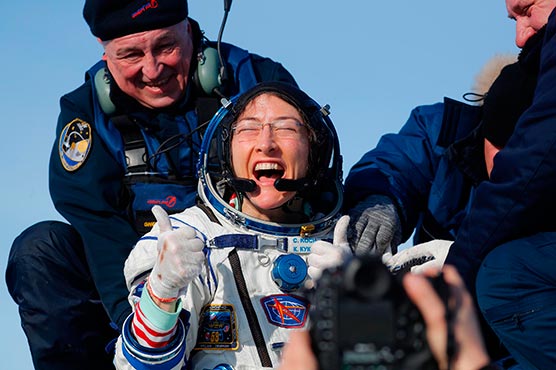Astronauts land back on Earth transformed by pandemic

Morgan had been on the ISS since July last year, while Meir and Skripochka arrived in September.
ALMATY (AFP) - Two NASA astronauts and a Russian cosmonaut on Friday made a safe return from the International Space Station to find the planet transformed by the coronavirus pandemic.
Andrew Morgan, Jessica Meir and Oleg Skripochka touched down in central Kazakhstan at 0516 GMT in the first returning mission since the World Health Organisation declared COVID-19 a global pandemic in March.
Morgan had been on the ISS since July last year, while Meir and Skripochka arrived in September.
"TOUCHDOWN! Welcome home, Oleg Skripochka, Andrew Morgan and Jessica Meir!" Russia’s Roscosmos space agency wrote on Twitter.
Unusually, NASA and Roscosmos did not show live footage of the trio parachuting down in their Soyuz landing capsule.
This was scrapped "due to technical limitations associated with the epidemiological situation," Roscosmos said.
Subsequent footage from the landing site showed recovery crews wearing face masks and rubber gloves as they hauled the crew members out of the Soyuz MS-15 capsule, which was lying on its side.
"Please keep your distance," one ground crew member could be heard telling another.
While the trio’s landing site southeast of the Kazakh town of Dzhezkazgan is the same as for previous crews, the pandemic has forced changes to mission-end protocol.
The crew will not be flying back home via Kazakhstan’s Karaganda airport as usual because it has been shut down, like so many other airports across the world.
Instead, Skripochka will fly from the Baikonur cosmodrome used to launch missions to the ISS while the NASA duo will take off in a plane from the steppe city of Kyzlorda after a drive of several hours.
In a media appearance aboard the ISS prior to her departure, Meir said it would be difficult to forego embraces with family and friends as she gets to grips with a new culture of physical distancing on Earth.
"I think I will feel more isolated on Earth than here," reflected Meir, who made history as one half of the first all-women spacewalk along with NASA colleague Christina Koch in October.
End to Russian monopoly
While the astronauts’ home planet fights the global battle against COVID-19, the ISS is also entering a new era as it prepares to welcome the first crew flown by Elon Musk’s SpaceX company as early as next month.
NASA has said that the SpaceX flight taking NASA astronauts Bob Behnken and Doug Hurley to the ISS could launch as early as the second half of May, ending Russia’s near decade-long monopoly on manned missions to the ISS from its Baikonur launchpad.
After blasting off from the Kennedy Space Centre, the pair will spend two to three months aboard the orbital lab, interrupting the usual rhythm aboard the ISS, where missions typically last around six months or longer.
They will be met by Anatoly Ivanishin and Ivan Vagner of Roscosmos and NASA’s Chris Cassidy, who arrived at the ISS from Baikonur on April 9, the first new crew members to join after the pandemic began.
The International Space Station -- a rare example of cooperation between Russia and the West -- has been orbiting Earth at about 28,000 kilometres per hour (17,000 miles per hour) since 1998.

